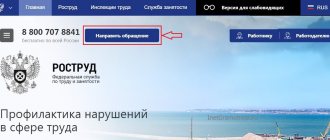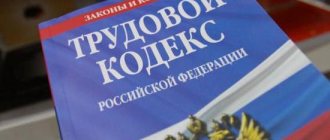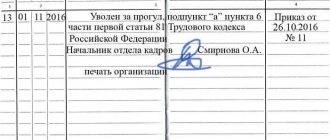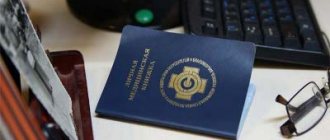Article 191 of the Labor Code of the Russian Federation. Incentives for work (current version)
1. According to Part 1 of the commented article, the employer encourages employees who conscientiously perform their job duties.
It is considered conscientious to perform job duties in strict accordance with the requirements for the performance of work, in compliance with the rules and regulations established by job descriptions, qualification characteristics of work, instructions and requirements for labor protection and other documents regulating the performance of a job function by an employee, in compliance with the current in organizing internal labor regulations.
Encouragement is a special form of public recognition of the employee’s merits in connection with the success he has achieved in his work. It not only has a positive moral impact on the employee, but can also lead to the provision of certain benefits and benefits. According to established practice, incentives for the successful and conscientious performance of one’s job duties are taken into account when deciding on promotion or preferential right to remain at work when reducing the number or staff of the organization’s employees, etc.
Reward has a positive impact not only on the rewarded employee, but also on other employees, i.e. is a certain incentive to conscientiously fulfill the duties assigned to them and to observe labor discipline.
In accordance with Part 1 of the commented article, the employer has the right to apply the following incentives to the employee:
- express gratitude;
- issue a bonus;
- award with a valuable gift, certificate of honor;
- nominate for the title of the best in the profession.
2. The specified list of incentives is not exhaustive. The regulations or charter on discipline, collective agreement or internal labor regulations may determine other types of incentives (for example, awarding the title “veteran honored worker of the industry”).
Thus, in accordance with the Regulations on the discipline of railway transport workers of the Russian Federation, railway transport workers can be awarded the “Honorary Railway Worker” badge. The Charter on the discipline of workers of the fishing fleet of the Russian Federation provides for such type of incentive as entry into the Book of Honor, the Book of Ship History and the Board of Honor (see Decree of the Government of the Russian Federation of September 21, 2000 N 708).
An employer can apply several incentives to an employee at the same time. In practice, as a rule, they combine measures of moral and material incentives, for example, declaring gratitude and issuing a bonus. Unlike previous legislation, the Labor Code does not provide for rules on the non-application of incentive measures to an employee during the period of validity of a disciplinary sanction.
In order to ensure the transparency and effectiveness of incentives, they are announced by order and brought to the attention of all employees.
3. For special labor services to society and the state, i.e. For services whose significance extends beyond the boundaries of a specific organization, employees may be nominated for state awards.
State awards are the highest form of encouragement for citizens of the Russian Federation for services in the field of state building, economics, science, culture, art and education, in strengthening the rule of law, protecting health and life, protecting the rights and freedoms of citizens, education, development of sports, for significant contributions to the cause defense of the Fatherland and ensuring the security of the state, for active charitable activities and other services to the state.
Regulations on state awards of the Russian Federation, approved. Decree of the President of the Russian Federation dated September 7, 2010 N 1099 establishes the following types of state awards:
a) the highest ranks of the Russian Federation;
b) Order of the Russian Federation;
c) insignia of the Russian Federation;
d) medals of the Russian Federation;
e) honorary titles of the Russian Federation.
The highest titles of the Russian Federation are the title of Hero of the Russian Federation and the title of Hero of Labor of the Russian Federation.
The following orders of the Russian Federation have been established: Order of St. Apostle Andrew the First-Called; Order of St. George; Order "For Merit to the Fatherland"; Order of the Holy Great Martyr Catherine; Order of Alexander Nevsky; Order of Suvorov; Order of Ushakov; Order of Zhukov; Order of Kutuzov; Order of Nakhimov; Order of Courage; Order of Military Merit; Order "For Naval Merit"; Order of Honor; Order of Friendship; Order of "Parental Glory"
The insignia of the Russian Federation are: the insignia - the St. George's Cross, the insignia "For good deeds", the insignia "For impeccable service".
The following medals of the Russian Federation have been established: medal of the Order of Merit for the Fatherland; Medal of Honor"; Suvorov medal; Ushakov medal; Zhukov medal; Nesterov medal; Pushkin medal; medal “For saving the dead”; medal “For Excellence in the Protection of Public Order”; medal “For Distinction in the Protection of the State Border”; medal “For works in agriculture”; medal "For the development of railways"; medal “For merits in space exploration; Medal of the Order of Parental Glory.
61 honorary titles of the Russian Federation have been established, including: “Pilot-Cosmonaut of the Russian Federation; "People's Artist of the Russian Federation"; "People's Architect of the Russian Federation"; "People's Teacher of the Russian Federation"; "People's Artist of the Russian Federation"; "Honored Artist of the Russian Federation"; "Honored Architect of the Russian Federation"; "Honored Artist of the Russian Federation"; "Honored Scientist of the Russian Federation"; “Honored Lawyer of the Russian Federation”, etc.
In accordance with the said Decree of the President of the Russian Federation, jubilee medals of the Russian Federation, awards established by federal government bodies and other federal government bodies, government bodies of constituent entities of the Russian Federation, public and religious associations are not considered state awards.
When presented for state awards, the type of award is determined by the nature and degree of merit of the recipient, which must comply with the statutes of orders of the Russian Federation, provisions on insignia of the Russian Federation, medals of the Russian Federation and honorary titles of the Russian Federation.
A petition for a state award is initiated at the place of main (permanent) work of the person nominated for the state award:
a) teams of organizations;
b) state bodies or local government bodies.
The decision to award a state award is made by the President of the Russian Federation on the basis of a proposal submitted to the President of the Russian Federation and a proposal from the Commission under the President of the Russian Federation for State Awards.
State awards are presented by the President of the Russian Federation.
On behalf of the President of the Russian Federation and on his behalf, state awards may be presented to:
a) Chairman of the Government of the Russian Federation;
b) members of the Government of the Russian Federation, heads of federal government bodies and other federal government bodies;
c) officials of the Administration of the President of the Russian Federation;
d) senior officials of the constituent entities of the Russian Federation;
e) heads of diplomatic missions and consular offices of the Russian Federation;
f) presidents of state academies of sciences;
g) commanders of military units, formations, commanders of associations, as well as other officials determined by the head of the relevant federal executive body in which military service is provided.
The President of the Russian Federation may entrust the presentation of state awards to other persons.
State awards and documents for them are presented to the recipients in a solemn ceremony no later than three months from the date of entry into force of the decree of the President of the Russian Federation on the award.
4. Types of awards for special labor merits also include state awards, prizes, certificates of honor and gratitude from the Government of the Russian Federation. They are awarded for achievements in the field of literature and art, science and technology, and in the field of education.
Federal Law No. 80-FZ of May 19, 1995 established the annual State Prize of the Russian Federation named after Marshal of the Soviet Union G.K. Zhukov for outstanding achievements in the field of military science and the creation of military equipment, as well as for the best works of literature and art dedicated to the Great Patriotic War.
The amount, procedure for awarding and presenting the State Prize are determined by the Regulations on the State Prize of the Russian Federation named after Marshal of the Soviet Union G.K. Zhukov, approved by Decree of the President of the Russian Federation of October 28, 1996 N 1499.
Decree of the President of the Russian Federation dated June 21, 2004 N 785 established four State Prizes of the Russian Federation in the field of science and technology and three State Prizes of the Russian Federation in the field of literature and art in the amount of 5 million rubles. each.
These prizes are awarded to citizens of the Russian Federation for their outstanding contribution to the development of domestic and world science and culture in order to stimulate further scientific and creative activities of the laureates of these prizes, creating favorable conditions for new scientific discoveries and creative achievements.
Decree of the Government of the Russian Federation dated January 31, 2009 N 73 provides for the awarding of the Certificate of Honor of the Government of the Russian Federation and the declaration of gratitude of the Government of the Russian Federation for services in promoting the implementation of social and economic policies of the state, the implementation of the effective activities of federal government bodies, the development of local self-government, ensuring the rule of law, the rights and freedoms of citizens, strengthening the country's defense capability and state security, implementing the state's foreign policy, as well as exercising other powers vested in the Government of the Russian Federation by the Constitution of the Russian Federation, federal constitutional laws, federal laws, and decrees of the President of the Russian Federation.
Citizens of the Russian Federation, as a rule, who are widely known, can be awarded such certificates and thanks.
Petitions for awarding a certificate and declaring gratitude may be initiated by local government bodies and organizations. These petitions are sent to the relevant senior officials of the constituent entities of the Russian Federation (heads of the highest executive bodies of state power of the constituent entities of the Russian Federation) or heads of federal government bodies.
The aforementioned Decree of the Government of the Russian Federation approved the Regulations on the Certificate of Honor of the Government of the Russian Federation and gratitude of the Government of the Russian Federation.
The Veterans Law provides for the title “labor veteran.” The procedure and conditions for conferring the title “labor veteran” are determined by the laws and other regulatory legal acts of the constituent entities of the Russian Federation.
Information about awards and incentives for labor merits is entered into the workers’ work books. According to clause 24 of the Rules for maintaining and storing work books, producing work book forms and providing employers with them, the following information is entered into work books:
- on awarding state awards, incl. on the conferment of state honorary titles on the basis of relevant decrees and other decisions;
- awarding certificates of honor, conferring titles and awarding badges, badges, diplomas, certificates of honor by employers;
- other types of incentives provided for by the legislation of the Russian Federation, as well as collective agreements, internal labor regulations, charters and regulations on discipline.
Comment source:
Rep. ed. Yu.P. Orlovsky “COMMENTARY ON THE LABOR CODE OF THE RUSSIAN FEDERATION”, 6th edition ACTUALIZATION
ORLOVSKY Y.P., CHIKANOVA L.A., NURTDINOVA A.F., KORSHUNOVA T.YU., SEREGINA L.V., GAVRILINA A.K., BOCHARNIKOVA M.A., VINOGRADOVA Z.D., 2014
Article 193. Procedure for applying disciplinary sanctions
Before imposing disciplinary action, the employer must request a written explanation from the employee. If after two working days the employee does not provide the specified explanation, then a corresponding act is drawn up.
Failure by an employee to provide an explanation is not an obstacle to applying disciplinary action.
Disciplinary action is applied no later than one month from the date of discovery of the misconduct, not counting the time of illness of the employee, his stay on vacation, as well as the time necessary to take into account the opinion of the representative body of employees.
A disciplinary sanction cannot be applied later than six months from the date of commission of the offense, and based on the results of an audit, inspection of financial and economic activities or an audit - later than two years from the date of its commission. The specified time limits do not include the time of criminal proceedings.
For each disciplinary offense, only one disciplinary sanction can be applied.
The employer's order (instruction) to apply a disciplinary sanction is announced to the employee against signature within three working days from the date of its publication, not counting the time the employee is absent from work. If the employee refuses to familiarize himself with the specified order (instruction) against signature, then a corresponding act is drawn up.
A disciplinary sanction can be appealed by an employee to the state labor inspectorate and (or) bodies for the consideration of individual labor disputes.
back to contents









